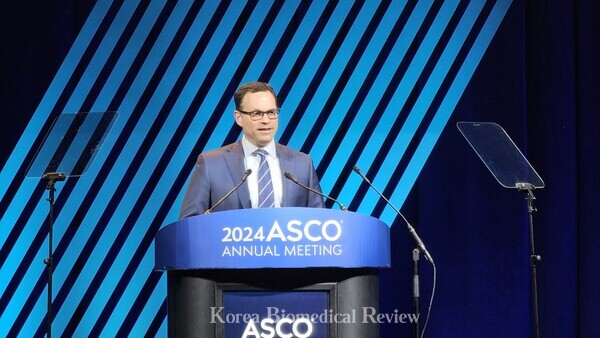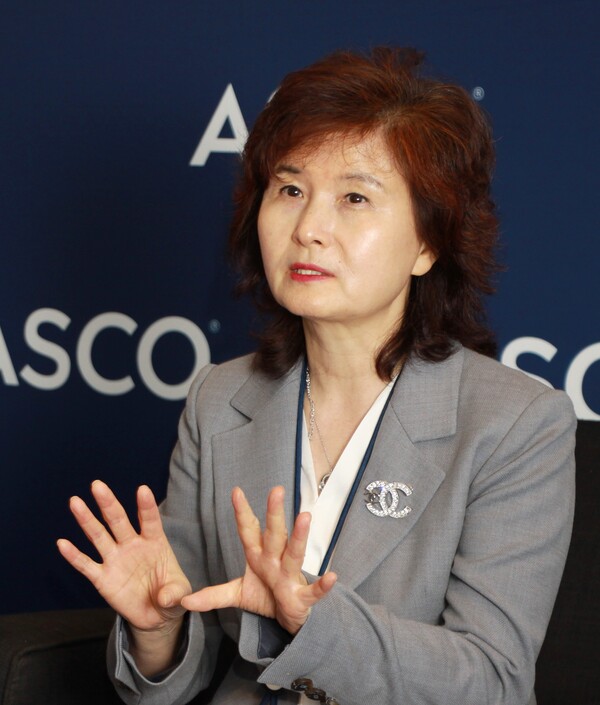CHICAGO, Ill. -- By Lee Han-soo/Korea Biomedical Review correspondent – A major advancement in lung cancer treatment was unveiled at the ASCO 2024 plenary session on Sunday, where AstraZeneca’s PD-L1 immune checkpoint inhibitor, Imfinzi (ingredient: durvalumab), demonstrated substantial efficacy as consolidation therapy for limited-stage small-cell lung cancer (LS-SCLC).

The highly anticipated results from the phase 3 ADRIATIC trial have the potential to redefine the therapeutic landscape for a disease that has historically seen limited progress. The study was presented by Professor David R. Spigel of the Sarah Cannon Research Institute.
The ADRIATIC trial evaluated the efficacy of durvalumab, alone or in combination with Imjudo (ingredient: tremelimumab), as consolidation therapy in patients with LS-SCLC who had not progressed after concurrent chemoradiotherapy (cCRT).
The trial compared these regimens against a placebo. The results presented at ASCO 2024 focused on the comparison between durvalumab monotherapy and placebo.
Historically, LS-SCLC has seen limited advancements in treatment, with cCRT being the mainstay therapy. This approach has offered modest outcomes, with a median survival of 25 to 30 months and a five-year survival rate of only 29 percent to 34 percent.
Durvalumab, already successful in treating extensive-stage SCLC as demonstrated in the CASPIAN trial, was now tested for its potential in LS-SCLC.
The trial’s main goals were to evaluate overall survival (OS) and progression-free survival (PFS), both reviewed by an independent committee. The findings were impressive as it showed durvalumab significantly extended both OS and PFS compared to placebo.
With a median follow-up of 37.2 months, the median OS for the durvalumab group was 55.9 months, compared to 33.4 months for the placebo group, reflecting a 27 percent reduction in the risk of death (HR 0.73). The three-year survival rate was 56.5 percent in the durvalumab group, compared to 47.6 percent in the placebo group.
The median PFS was 16.6 months for durvalumab versus 9.2 months for placebo, translating to a 24 percent reduction in the risk of disease progression or death (HR 0.76). Notably, 46.2 percent of patients in the durvalumab group remained progression-free at two years, compared to 34.2 percent in the placebo group.
"Durvalumab as consolidation treatment after cCRT demonstrated statistically significant and clinically meaningful improvement in OS and PFS compared with placebo in patients with LS-SCLC," Professor Spigel said. "The treatment benefit was generally consistent across predefined patient subgroups for both OS and PFS.”
Durvalumab consolidation treatment for up to two years was well tolerated, and safety findings were consistent with the known safety profile of durvalumab monotherapy in the post-CCRT setting, he added.
According to Spigel, the safety profile of durvalumab was favorable, with no significant difference in the incidence of grade 3 or 4 adverse events or serious adverse events compared to the placebo group.
“Although immune-related adverse events were more common in the durvalumab group (32.1 percent versus 10.2 percent in the placebo), only 5.3 percent of these were grade 3 or 4,” he said. “In conclusion, consolidation durvalumab will become the new standard of care for patients with LS-SCLC who have not progressed after CCRT

Professor Ahn Myung-ju of the Department of Hematology-Oncology at Samsung Medical Center highlighted the broader implications of these findings.
"In the field of small-cell lung cancer, which has seen no significant progress since the 1980s, the emergence of new therapeutic options like durvalumab is highly promising.”
The ADRIATIC trial has shown meaningful results in LS-SCLC, an area with a significant unmet need, she added.
Ahn stressed that durvalumab's success in both extensive and limited stages of SCLC marks it as the first therapeutic option to demonstrate such efficacy across these stages.
“The advancements signal a potential overall improvement in survival rates for lung cancer patients," Ahn said. "With durvalumab now proving effective in limited-stage disease, it paves the way for a new era in SCLC treatment."
Related articles
- [Photo News] Leading pharma giants unveil cutting-edge oncology research at ASCO 2024
- [ASCO 2024] Osimertinib emerges as an ‘one-fits-all’ treatment for all stages of unresectable EGFRm NSCLC
- [ASCO2024] Lunit's AI software aims to enhance accuracy in detecting HER2 ultralow levels
- [ASCO2024] Moderna's individualized neoantigen therapy shows broad efficacy in cancer treatment
- [ASCO 2024] Korean researchers highlight precision medicine advances with KOSMOS-II study findings
- Young-PEARL study’s survival data marks new milestone in premenopausal breast cancer at ASCO 2024
- [Reporter’s Notebook] Korea's clinical trial successes threatened by government policies, staffing shortages
- AstraZeneca Korea’s oral D-factor inhibitor Voydeya approved for PNH treatment
- AstraZeneca's Imfinzi adds indication for adjuvant therapy before and after lung cancer surgery

